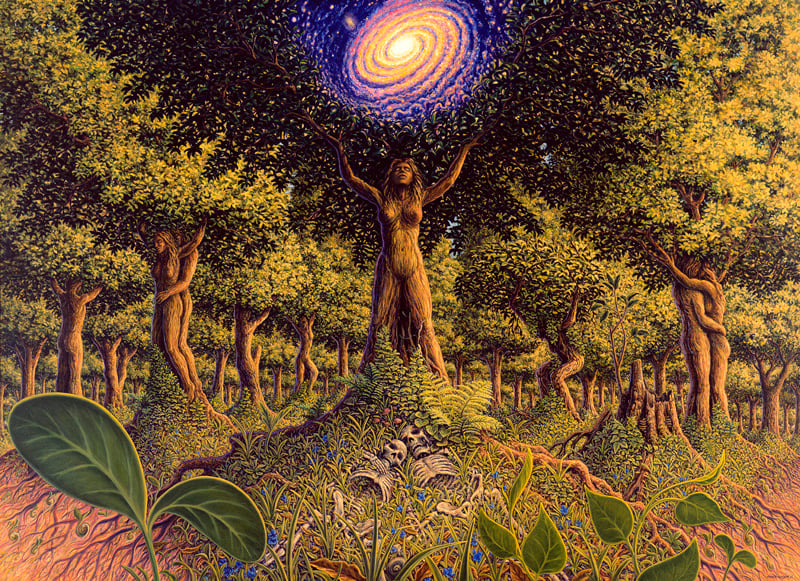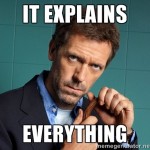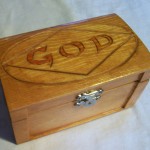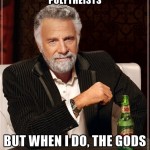I don’t think that any one group owns the copyright on the word “polytheist”. While I don’t actually call myself a polytheist, I do believe there is such a thing as Jungian “polytheism” (quotation marks optional), and that it describes one aspect of my theology. I’ll write more about that in a future post.

In the meantime, there are also other forms of polytheism, in addition to a Jungian “polytheism”, which don’t really fit in the narrow definition of “the belief in and veneration of multiple Deities as distinctly independent Beings external to the human mind.” Jordan Paper observes in his book, The Deities Are Many: A Polytheistic Theology, that polytheistic traditions are invariably experiential and that the relationships with the deities are reciprocal. But beyond these two commonalities, Jordan says, the varieties of polytheism are immense.
Consider Alison Leigh Lilly’s “natural or ecological polytheism” which sees the gods as part of nature which (like our very own selves), rather than being made of distinct and separate things, is porous and flowing, like a river:
“In this natural theology, identity is responsive and creative, and divinity, like everything else in the sacred cosmos, is interwoven, connecting us all to all other aspects of being. We move through a world rife with gods and spirits, and a multitude of gods dwell within each of us. We show up to liminal places of communication — whether they be small altars tucked away in our homes, or the banks of a raging river carving serpentine paths through the wide, rolling landscape — and we open ourselves to experiences of connection in which we discover the porous, flexible natures of our own boundaries. We practice our spirituality through ritual and prayer, and discover that boundaries are not rigid constructs that separate us from the gods, but sacred points of contact, created and destroyed and re-created with every holy act. We rub up against divine being with every turn in the sacred dance, feeling the warm friction of our extremities, the very limits that define our beauty and direct our power.”
To put it simply, if the gods are individuals as we humans are, then we she founder how we humans aren’t as individual as we think we are. In a recent post, Alison explains, “For me, the hard polytheist definition of the gods as ‘separate, discrete and individual beings’ is simply too brittle, placing undue focus on exclusionary boundaries and either/or ontological experiences.” Alison’s gods defy rigid definition. They are not any one thing:
“There are gods who forever remain elusive, whose identities shift with the landscape, the seasons and the stars. And there are gods so intimate that they are never really absent at all, and meeting them is not a matter of inviting their presence but rather of quieting my own expectations and learning how to listen. There are gods whose presence looms like a mountain range on the horizon, and gods with(in) whom I walk with grace, my footsteps just one more melody in the great pattern of their being.”
Similarly, consider Glen Gordon’s post “I See Gods Everywhere”. Glen describes himself as an animist, a monist, and a “natural polytheist”. He attempts to bring together the insights of process theology and transpersonal psychology to articulate a view of the gods as ” complex overlapping evolutionary processes”. To put it another way, Glen describes the gods, not as nouns, but as verbs. Glen has written elsewhere, “Because I see them as processes doesn’t mean they are not persons. Quite the contrary, at the essence I think every person is a processes.” Whether Glen’s description of the gods resonates with you or not, I think he is to be applauded for drawing on other fields of inquiry to create a fluid and flexible interpretation of the gods.
Morpheus Ravenna also recently approached the question of the separateness of the gods from the perspective of ecology, observing that the degree of separateness is really a question of perspective:
“[…] the natural world is this matrix of beings and forces interacting at different scales. You can look at one scale and see individual creatures which appear to be separate and discrete, interacting with one another. Look at another scale and you see populations, separable from one another and interacting with other populations. Look at another scale and you see huge, global forces that subsume the individual into great ecologies of energy and life force.”
The same goes for the gods, who are part of nature. Much like Alison, the Morpheus gods exist on multiple levels, from “Local spirits-of-place Gods, like the tiny endemic population of this-kind-of-poppy-with-the-spot-on-its-petals which has only ever been found on one mountain in one county in one land” to “Gods who are nothing but the endless omnipotent life force endlessly taking shape in all things.”
Morpheus explains that she calls herself a polytheist, not because she claims to know what the objective nature of the gods is, but because she most readily encounters the gods on the personal level:
“I call myself a polytheist Pagan, and not a monist or archetypalist or anything else, not because I am sure that I know the nature of the Gods, and certainly not because I want to get stuck looking at Them at only one scale. I call myself a polytheist because what matters in religious practice is not the ultimate-cosmic-objective-truth which I have no way of ever verifiably knowing. What matters in religious practice is the level on which we as beings inhabiting bodies are able to sense and interact with all the worlds. Thus, while I acknowledge that it is possible that the Gods I know are merely reflections of some great unified cosmic God-force that is beyond identities, it is kind of irrelevant to me. Because when I do my ritual practice, They show up with faces (sometimes) and identities (usually) and They engage with me as persons.”
And while, for Morpheus, the word “polytheism” implies the personhood of the gods (i.e., theism), I think that can still be a broad definition, depending on how “personhood” is defined. For example, some animists recognize the personhood of trees and rocks; these are persons without faces. And that brings us back around to something like Alison’s natural polytheism.
A natural polytheism like Alison’s is one that I think would be countenanced by Julian Betkowski’s “Polytheist Manifesto”. Julian writes:
“I feel that Polytheism represents an incredibly useful and open-ended way of understanding our relationships not only with the Divine, but also with each other, other beings, and the world at large. […] Polytheism is capable of recognizing diverse and varied spiritual and religious potentials. […] Thus, I believe that Polytheism is capable of fostering an incredible tolerance and acceptance across various religious and spiritual understandings. It is not necessary for Polytheism to denounce one spiritual truth in order for another to be true. Polytheism can tolerate multiple truths simultaneously, even if those truths contain apparent contradictions.
Indeed, Julian acknowledges that “Polytheism is not necessarily contradictory to animism and the myriad forms of nature worship and reverence.” This is a polytheism that makes sense to me, a polytheism that is expansive, inclusive. A polytheism that recognizes that “the divine is multiple, fragmented and diverse” (David Waldron). A polytheism that is as focused on the poly- at least as much on the -theism.
Are there other forms of polytheism that go beyond “the belief in and veneration of multiple Deities as distinctly independent Beings external to the human mind”, other forms of polytheism “beyond the pale” (to borrow Alison’s phrase)? If you are a polytheist with an expansive understanding of polytheism, please share in the comments.











